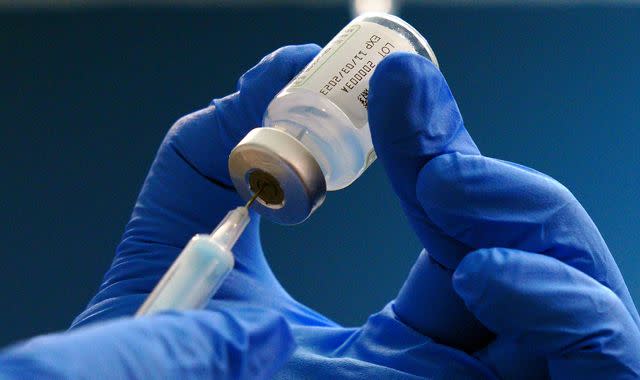'Hypervaccinated' patient had 217 COVID-19 jabs in less than three years, scientists say

A "hypervaccinated" patient is said to have received more than 200 COVID-19 injections in less than three years, scientists have reported.
The unnamed man, a 62-year-old German national from the eastern city of Magdeburg, had 217 vaccines for "private reasons" over a period of 29 months, according to medical journal, Lancet Infectious Diseases.
Academics contacted the patient after reading about him in newspaper reports - and asked if they could study his body's response to multiple jabs.
He had "no signs" of ever being infected with the virus that causes COVID-19 and had not reported any vaccine side effects, according to researchers based at the University of Erlangen-Nuremburg.
Dr Kilian Schober, chair of the university's microbiology department, said: "We learned about his case via newspaper articles. We then contacted him and invited him to undergo tests in Erlangen."
The patient was "very interested" in doing so, Dr Schober added.
Some 134 vaccinations, using eight different vaccines, have been officially confirmed.
No noticeable side effects were triggered despite the "extraordinary hypervaccination", Dr Schober said - indicating the drugs have "a good degree of tolerability".
Researchers also examined previous blood tests as well as blood samples as he went on to receive further vaccines - including some jabs "at his own insistence".
Dr Schober said: "The individual has undergone various blood tests over recent years, he gave us permission to assess the results of these analyses.
"In some cases, samples had been frozen, and we were able to investigate these ourselves.
"We were also able to take blood samples ourselves when the man received further vaccination during the study at his own insistence."
Immune system 'fully functional' despite many jabs
The samples were used to determine how vaccinations affected the patient's immune system - with the research concluding it was "fully functional".
Certain immune cells and antibodies against the virus which causes COVID-19 were present in considerably higher levels compared to people who had received three vaccines, the study found.
One of the leading authors of the project, Katharina Kocher, said: "Overall, we did not find any indication for a weaker immune response, rather the contrary."
Dr Schober said: "Until now, it has been unclear what effects hypervaccination such as this would have on the immune system.
"Some scientists were of the opinion that immune cells would become less effective after becoming used to the antigens.
"This proved not to be the case in the individual in question: his immune system is fully functional."
Read more:
Owners say pandemic puppies are badly behaved
Mum launches legal action over daughter's long COVID
What are the NHS waiting times in your local area?
However, the results are based on "one individual case" and are "not sufficient for making far-reaching conclusions let alone recommendations for the general public," Dr Schober warned.
He added: "Current research indicates that a three-dose vaccination, coupled with regular top-up vaccines for vulnerable groups, remains the favoured approach.
"There is no indication that more vaccines are required."
The lockdowns imposed during the COVID-19 pandemic also saw changes in newborn babies that may have helped to protect them against allergies, according to a study published earlier this month.
On 31 January this year, exactly four years after the UK's first coronavirus cases were confirmed in the UK, scientists warned the virus is "still evolving at an incredible rate".

 Yahoo News
Yahoo News 
